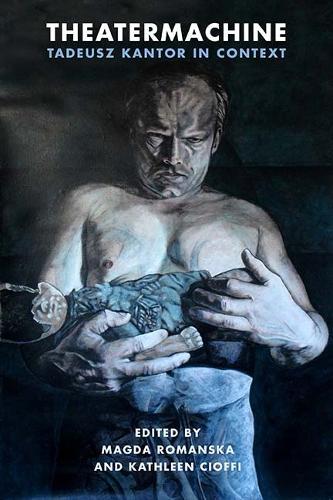Overview
Theatermachine: Tadeusz Kantor in Context is an in-depth, multidisciplinary compendium of essays about one of the most influential theater artists of the twentieth century. Hans-Thies Lehmann’s theory of postdramatic theater and developments in critical theory—particularly Bill Brown’s thing theory, Bruno Latour’s actor-network theory, and posthumanism—serve to provide a previously unavailable vocabulary for discussion of Kantor’s theater. Drawing on diverse approaches, the contributors write about Kantor from both global and local perspectives: as an exemplar of “postdramatic tragedy”; in relationship to Jewish culture and Yiddish theater; through the prism of postmemory and trauma theory; and in relation to Japanese, German, French, Polish, and American avant-garde theater. This comprehensive anthology arrives at a time when we grapple with the materiality of our modern lives—AI, technobjects, and algorithms—and might thus also be better poised to understand the materiality that permeates Kantor’s theater. Theatermachine argues that while confronting the twentieth century’s most pressing, but least comfortable, questions—those of a human’s worth, dignity, essence, and purpose—Kantor might also have been, unwittingly, a harbinger of the twenty-first century’s political, ethical, aesthetic, and critical discourse.
Full Product Details
Author: Magda Romanska ,
Kathleen Cioffi ,
Martin Leach ,
Michal Kobialka
Publisher: Northwestern University Press
Imprint: Northwestern University Press
Dimensions:
Width: 15.10cm
, Height: 1.90cm
, Length: 22.90cm
Weight: 0.525kg
ISBN: 9780810140240
ISBN 10: 0810140241
Pages: 304
Publication Date: 30 April 2020
Audience:
Professional and scholarly
,
Professional & Vocational
Format: Paperback
Publisher's Status: Active
Availability: In Print

This item will be ordered in for you from one of our suppliers. Upon receipt, we will promptly dispatch it out to you. For in store availability, please contact us.
Reviews
An invaluable and much needed collection on the incomparable Kantor--his work, his life, his theatrical prescience. Kantor confronted the twentieth century in profound ways that changed the future of theater. This volume approaches his methods and means through twenty-first century lenses that Kantor's own work might be said to have forecast--post-dramatic theory, new materialism, thing theory, and posthumanism. As such, Theatermachine expands our understanding not only of the theater artist but of theory and practice that would follow. --Rebecca Schneider, Brown University, the author of Performing Remains: Art and War in Times of Theatrical Reenactment . . . these rich and profound essays not only place Kantor retrospectively into the theatrical past, but also argue persuasively for his relevance in the 21st century as an avatar of postdramatic and posthuman performance, and of object theater and performance art. --R. Remshardt, University of Florida, CHOICE The most important result of this publication is that through this entanglement of different discourses, cultures, and narrations, Kantor's art reveals itself not only as practice but also as a strong theoretical proposal. His thinking about how matter, performance, objects, and actors can be realized on stage and in art can now be understood not merely as material for interpretation but as an autonomous theory feeding contemporary discussions and practices and offering different categories and models. This is why his art is still interesting today and why it can be important in the global context. --Dorota Sosnowska, Modern Drama This groundbreaking collection of beautifully edited essays is impressive in both scope and depth. The book deftly interweaves Kantor's Polish, Jewish, international, and theoretical roots, thus illuminating essential connections between each in thrilling new ways. --Dassia Posner, author of The Director's Prism: E. T. A. Hoffmann and the Russian Theatrical Avant-Garde A unique collection, full of splendid writing and vivid insight, destined to become an essential resource on one of the twentieth century's seminal experimental theater artists. --Jonathan Kalb, Hunter College, the author of Great Lengths: Seven Works of Marathon Theater
This groundbreaking collection of beautifully edited essays is impressive in both scope and depth. The book deftly interweaves Kantor's Polish, Jewish, international, and theoretical roots, thus illuminating essential connections between each in thrilling new ways. --Dassia Posner, Northwestern University, author of The Director's Prism: E. T. A. Hoffmann and the Russian Theatrical Avant-Garde An invaluable and much needed collection on the incomparable Kantor--his work, his life, his theatrical prescience. Kantor confronted the twentieth century in profound ways that changed the future of theater. This volume approaches his methods and means through twenty-first century lenses that Kantor's own work might be said to have forecast--post-dramatic theory, new materialism, thing theory, and posthumanism. As such, Theatermachine expands our understanding not only of the theater artist but of theory and practice that would follow. --Rebecca Schneider, Brown University, the author of Performing Remains: Art and War in Times of Theatrical Reenactment A unique collection, full of splendid writing and vivid insight, destined to become an essential resource on one of the twentieth century's seminal experimental theater artists. --Jonathan Kalb, Hunter College, the author of Great Lengths: Seven Works of Marathon Theater
Author Information
Magda Romanska is an associate professor in the department of performing arts at Emerson College and the author of Post-traumatic Theatre of Grotowski and Kantor. Kathleen Cioffi is a theater historian who specializes in Polish theater. She is the author of Alternative Theatre in Poland, 1954–1989.



